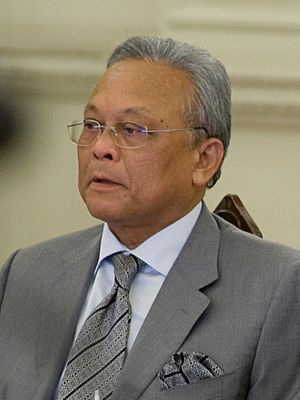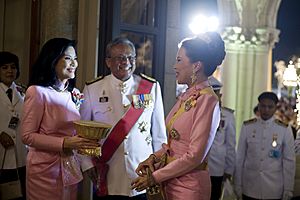Suthep Thaugsuban facts for kids
Quick facts for kids
Suthep Thaugsuban
MPCh MWM
|
|
|---|---|
|
สุเทพ เทือกสุบรรณ
|
|

Suthep in 2010
|
|
| Deputy Prime Minister of Thailand | |
| In office 20 December 2008 – 9 August 2011 |
|
| Prime Minister | Abhisit Vejjajiva |
| Minister of Transport | |
| In office 14 November 1997 – 9 November 2000 |
|
| Prime Minister | Chuan Leekpai |
| Preceded by | Suwat Liptapanlop |
| Succeeded by | Wan Muhamad Noor Matha |
| Personal details | |
| Born | 7 July 1949 Phunphin, Surat Thani, Siam |
| Nationality | Thai |
| Political party | Action Coalition Party (since 2018) |
| Other political affiliations |
People's Democratic Reform Committee (2013–14) Democrat Party (1979–2013) |
| Spouse | Chuthaporn Thaugsuban (1978–1990) |
| Domestic partner |
Srisakul Promphan
(m. 1994) |
| Children | 3 |
| Relatives | Akanat Promphan (son-in-law) |
| Alma mater |
|
| Profession | Politician |
Suthep Thaugsuban (born 7 July 1949) is a Thai former politician. He used to be a Member of Parliament for Surat Thani province. For many years, he was a leader in the Democrat Party. He also served as a deputy prime minister.
In 2013, he left Parliament to lead large protests. These protests aimed to change the government. After a military takeover in 2014, Suthep was briefly held. He then decided to step away from politics. For a year, he became a Buddhist monk. Later, he led a group called the Muan Maha Prachachon for Reform Foundation. This group supported changes to Thailand's rules.
Contents
Early Life and Education
Suthep Thaugsuban was born in Tha Sathon, a town in Surat Thani Province, Southern Thailand. His father was a local leader in their area.
Suthep studied Political Science at Chiang Mai University. After that, he went to the United States for his master's degree. He finished his studies in 1975. When he was 26, he became the local leader of Tha Sathon, just like his father. His family owns many palm oil farms and shrimp farms in Southern Thailand.
Political Journey
Suthep started his political career in 1979. He was elected as a Member of Parliament for Surat Thani province. This area was a strong base for the Democrat Party. He was re-elected in every election that followed.
From 1986 to 1988, he worked as a deputy minister of agriculture. He held this same job again from 1992 to 1994. When the Democrat Party came back to power in 1997, Suthep became the Minister of Transport and Communication. He held this position until 2001.
In 2005, when Abhisit Vejjajiva became the leader of the Democrats, Suthep was chosen as the party's secretary-general. In December 2008, Abhisit became prime minister. Suthep then became a deputy prime minister. He was in charge of internal security.
In the 2011 election, the Democrats lost. Suthep then stepped down as the party's secretary-general. His time as deputy prime minister ended in August 2011.
Leading Protests for Change
Suthep became a main leader of protests that began in late 2013. These protests started because of a proposed law about forgiveness for past actions. On December 11, 2013, Suthep left his seat in Parliament. He also left the Democrat Party to focus on leading the protests.
Even after the government stopped the proposed law, Suthep and his followers continued their protests. They wanted the prime minister to resign. They also wanted big changes to Thailand's political system. On November 29, 2013, Suthep became the leader of the People's Democratic Reform Committee (PDRC). This group wanted a new way of governing the country.
After a military takeover in May 2014, Suthep was held for a few days. He was later released. In July 2014, he became a Buddhist monk. He lived at a meditation center in Chaiya District.
The People's Democratic Reform Foundation
On July 30, 2015, Suthep Thaugsuban and other former protest leaders started a charity group. It was called "the Great Mass of the People for Reform of Thailand." This group was funded by donations from Thai citizens. It aimed to work with the military government to bring about changes peacefully. They did not plan to hold rallies or protests.
See also
 In Spanish: Suthep Thaugsuban para niños
In Spanish: Suthep Thaugsuban para niños
- Democrat Party (Thailand)
- Abhisit Vejjajiva
 | Jackie Robinson |
 | Jack Johnson |
 | Althea Gibson |
 | Arthur Ashe |
 | Muhammad Ali |


